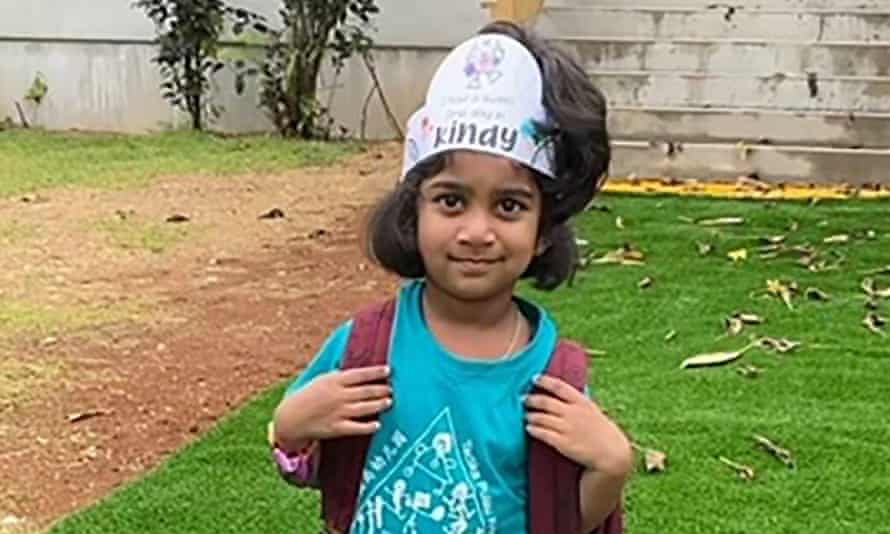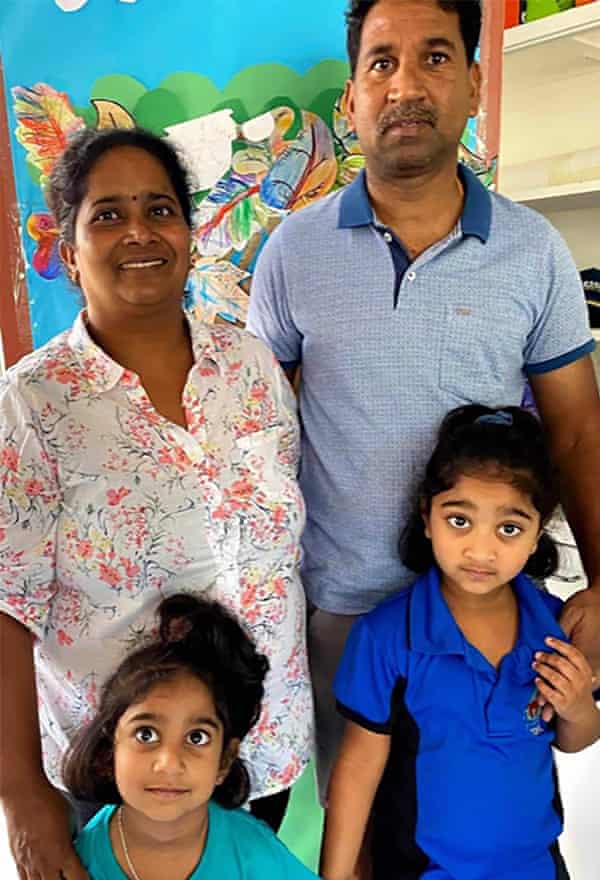Court’s decision compels immigration minister to review the four-year-old’s eligibility for assessment as an asylum seeker

Last modified on Thu 12 Aug 2021 15.28 AEST
The high court has rejected a bid from the Murugappan family from Biloela to hear an appeal on part of a full federal court judgment on the protection visa application of the youngest daughter, four-year-old Tharnicaa.
Priya and Nades Murugappan and their daughters, Kopika and Tharnicaa, were moved into community detention in Perth in June after over 1,000 days in detention in Melbourne and Christmas Island while legal issues were yet to be decided.
The Tamil family was put into community detention in Perth after public outcry over their plight when Tharnicaa was evacuated to Western Australia for medical treatment for a blood infection caused by untreated pneumonia.
The family won a full federal court appeal in February, with the court upholding a ruling that the government’s handling of Tharnicaa’s visa application denied her procedural fairness.
The court said it was “Kafkaesque” that the government failed to inform the family that a decision had been reached on whether to consider her application.
The federal government did not appeal the ruling, but the family sought leave to appeal part of the decision around whether the bar preventing Tharnicaa from applying for a visa had remained lifted since 2017 when the ministerial determination was made.

The high court’s decision not to hear the appeal has been a disappointment for the Murugappan family, however, there are still legal processes under way, with a separate case being heard in the federal court in September.
The full federal court decision also compels the immigration minister, Alex Hawke, to review Tharnicaa’s eligibility for assessment as an asylum seeker. He has had a brief detailing her case since June, and advocates have called on Hawke to use his power to allow Tharnicaa to apply for asylum.
“The matter is now in the hands of the immigration minister and he or she is able at any point in time to grant a visa including a visa that would allow the family to return to and live in Biloela where they would receive community support, stability, care and a sense of belonging,” the family’s lawyer, Carina Ford, said.
“At a time when much of the Australian community is currently in lockdown, there is an understanding of just how difficult it must have been for the family, being detained for three years. The ethical, economic and compassionate decision to be made should be to allow them to stay and be returned home to Bilo.”
Priya said in a statement WA doctors have contacted the federal government asking for the family to be returned to Biloela, with both daughters receiving ongoing medical treatment for recurring infections and mental health issues.
“Tharni and Kopi are still having to see doctors, but this could happen back in my community of Biloela. Biloela is where the girls will get better and be safe. Please Minister Hawke, let us return to our community in Biloela.”
Hawke noted the high court decision but declined to comment further.
“I note the high court’s decision follows a series of previous decisions by the Department of Home Affairs, administrative appeals tribunal, federal circuit court, federal court, full federal court and high court in relation to the family,” he said.
“The family has a number of other ongoing legal matters. It is therefore inappropriate for me to comment further.”
Dr Carolyn Graydon, the Asylum Seeker Resource Centre’s human rights law program principal solicitor said the family’s case shows how the “fast track” determination process for people who arrived by sea was costly and undermining the integrity and reliability of Australia’s refugee determination system.
“Their cases highlight how the fast track process is designed to punish those who arrived by sea, and continues to churn out unlawful decisions, indicated by the significant 40% of Immigration Assessment Authority (IAA) decisions later found to be unlawful when appealed to the federal circuit court.”
An Essential poll on behalf of the Asylum Seeker Resource Centre found 52% of people support the family being returned to Biloela on permanent visas, including 46% among Liberal and National voters.
No comments:
Post a Comment